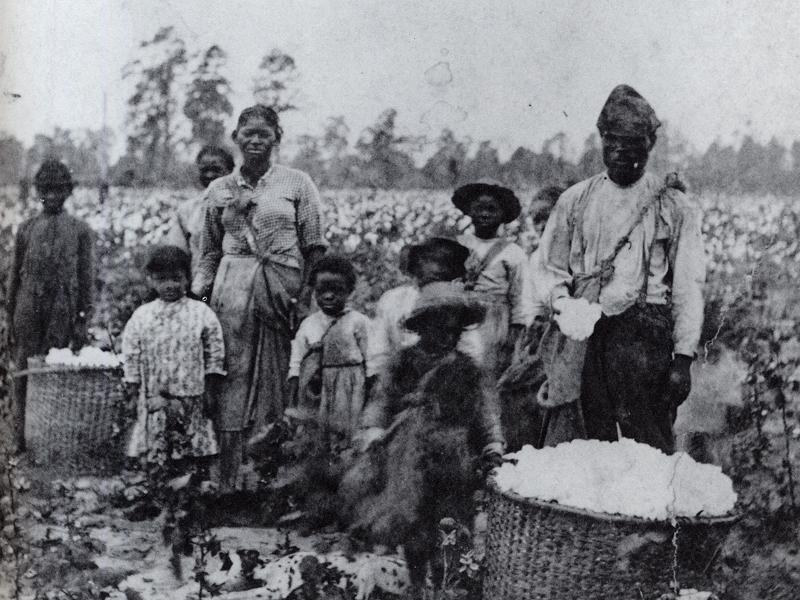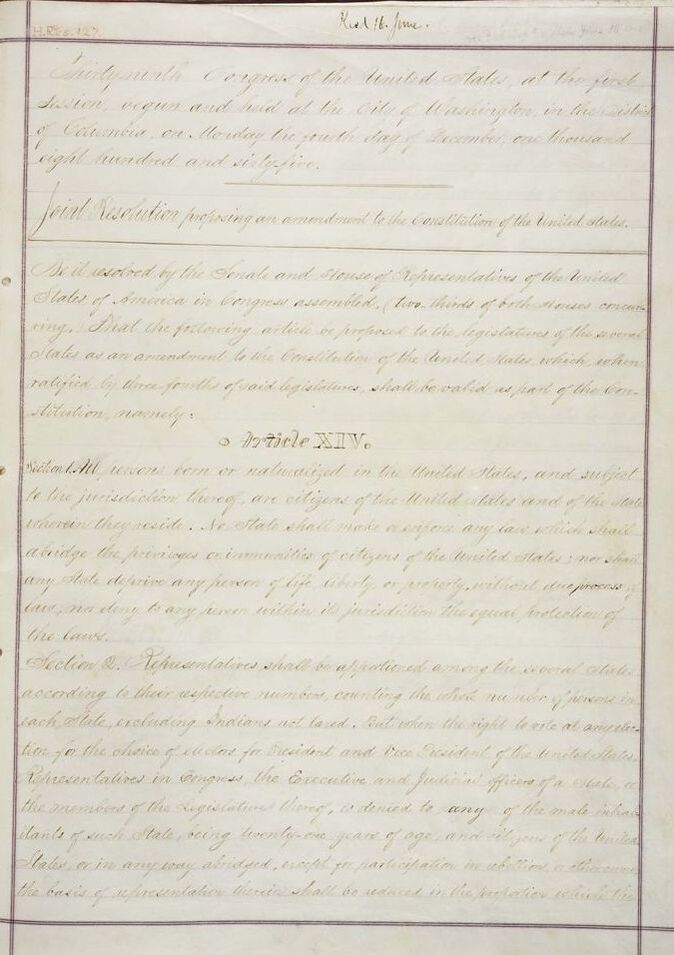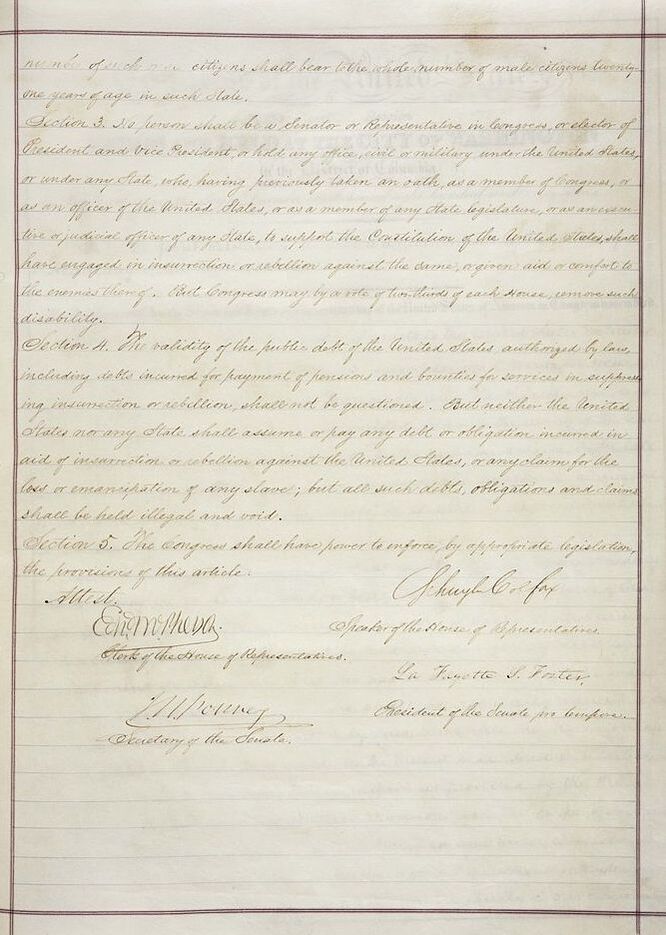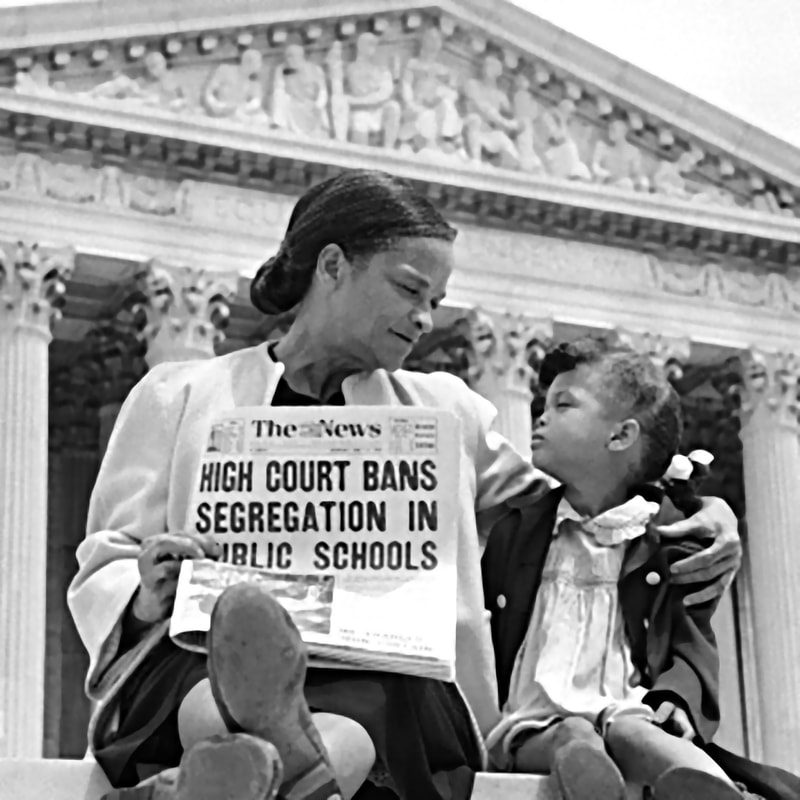FOURTEENTH AMENDMENT OF THE
UNITED STATES CONSTITUTION
The Fourteenth Amendment of the United States Constitution is one of the most significant events in American history from the 19th century. It is especially important in relation to the history of slavery in the United States and the events of the American Civil War. This is because the Fourteenth Amendment dealt with citizenship rights and equal protection under the law for former slaves. It was ratified on July 8th, 1868, just three years after the Thirteenth Amendment, which had abolished slavery. In fact, the Fourteenth Amendment was significant in relation to the Thirteenth Amendment and the Fifteen Amendment of the American Constitution. Together, the three amendments are often referred to as the ‘Reconstruction Amendments’ since they dealt with issues resulting from the end of the American Civil War and the period of Reconstruction in the United States.
PASSAGE OF THE FOURTEENTH AMENDMENT
|
Slavery in the United States existed from the period of Colonial America in the early 17th century until the events of the American Civil War, which lasted from 1861 until 1865. During the events of the Civil War, American President Abraham Lincoln took steps to limit slavery. For instance, in 1862 Lincoln announced the Emancipation Proclamation. Lincoln issued the Emancipation Proclamation on September 22nd, 1862, and it became effective as of January 1st of 1863. It declared that all slaves held in Confederate States were free. With this said, it did not outright end slavery in the United States, so as the Civil War came to an end, the United States government sought to pass an amendment to the United States Constitution which achieved this. As such, on December 18th in 1865, the Thirteenth Amendment of the United States Constitution was adopted.
|
The Thirteenth Amendment formally abolished slavery in the United States. However, following the ban on slavery, there were still many issues facing former slaves. As such, legislators again visited the issue with the Fourteenth Amendment.
One of the main issues that emerged out of the Thirteenth Amendment was the issue of rights for freed slaves. Many in the Southern states did not want to extend voting rights to the freed slaves. However, many in the Northern states feared that the Southern states would gain a political advantage in the House of Representatives. This is because representation in the House of Representatives is based upon population. As such, with freed slaves now counting towards the population, it meant an increase in political power for the South and the Democratic Party, which was most popular political party in the former slave states. As such, the Republican Party believed it necessary to promote rights for former slaves in order to help the Republican influence in the South. This situation eventually led to the passage of the Civil Rights Act of 1866.
The Civil Rights Act of 1866 was enacted on April 9th in 1866 during the presidency of Andrew Johnson. It was created following the American Civil War as an attempt to help protect former slaves. For instance, the act dealt with matters related to citizenship and protected all citizens as equal under the law. This was significant at the time, because, as stated above, there was fear in the Northern states that the former slaves in the South were not going to be afforded the same rights as the white citizens. The Civil Rights Act of 1866 was especially significant to the ‘Black Codes’. Following the end of the American Civil War, several Southern states passed laws that are commonly referred to as ‘Black Codes’ as a way of controlling the societal, political and economic activities of African Americans. In fact, the Black Codes were attempts by some states to continue with aspects of slavery after the passage of the Thirteenth Amendment, which abolished slavery in the United States.
There were many different proposals of the Fourteenth Amendment that were constructed throughout 1865 and 1866. The central issues of the time centered on voting rights for former slaves and equal protection under the law regardless of race. Finally, in April of 1866, a proposal was sent forward to Congress that included elements of both, with several compromises. For instance, the proposal included provisions related to Confederate war debt from the Civil War, and rights for former Confederates. The Senate and the House of Representatives voted on the proposal in June of 1866 and passed it. Following this, the Fourteenth Amendment was sent to the states for the process of ratification.
For the amendment to be approved, it had to be ratified by two-thirds of the states. This was a bit of an issue because the Fourteenth Amendment was very unpopular in the Southern states, which had previously been in the Confederacy. In fact, most of the Southern states refused to ratify the new amendment. However, the Congress pressured the former Confederate states to ratify the Fourteenth Amendment by denying them representation in the Congress until it ratified. As such, this led to the eventual ratification of the Fourteenth Amendment by the required number of states and it was adopted on July 9th in 1868.
TEXT OF THE FOURTEENTH AMENDMENT
- Section 1 - All persons born or naturalized in the United States, and subject to the jurisdiction thereof, are citizens of the United States and of the State wherein they reside. No State shall make or enforce any law which shall abridge the privileges or immunities of citizens of the United States; nor shall any State deprive any person of life, liberty, or property, without due process of law; nor deny to any person within its jurisdiction the equal protection of the laws.
- Section 2 - Representatives shall be apportioned among the several States according to their respective numbers, counting the whole number of persons in each State, excluding Indians not taxed. But when the right to vote at any election for the choice of electors for President and Vice President of the United States, Representatives in Congress, the Executive and Judicial officers of a State, or the members of the Legislature thereof, is denied to any of the male inhabitants of such State, being twenty-one years of age, and citizens of the United States, or in any way abridged, except for participation in rebellion, or other crime, the basis of representation therein shall be reduced in the proportion which the number of such male citizens shall bear to the whole number of male citizens twenty-one years of age in such State.
- Section 3 - No person shall be a Senator or Representative in Congress, or elector of President and Vice President, or hold any office, civil or military, under the United States, or under any State, who, having previously taken an oath, as a member of Congress, or as an officer of the United States, or as a member of any State legislature, or as an executive or judicial officer of any State, to support the Constitution of the United States, shall have engaged in insurrection or rebellion against the same, or given aid or comfort to the enemies thereof. But Congress may, by a vote of two-thirds of each House, remove such disability.
- Section 4 - The validity of the public debt of the United States, authorized by law, including debts incurred for payment of pensions and bounties for services in suppressing insurrection or rebellion, shall not be questioned. But neither the United States nor any State shall assume or pay any debt or obligation incurred in aid of insurrection or rebellion against the United States, or any claim for the loss or emancipation of any slave; but all such debts, obligations and claims shall be held illegal and void.
- Section 5 - The Congress shall have power to enforce, by appropriate legislation, the provisions of this article.
IMPACTS OF THE FOURTEENTH AMENDMENT
The Fourteenth Amendment had several main impacts on the United States in the time after the end of the Civil War. Out of the of the three ‘Reconstruction Amendments’ the Fourteenth Amendment has likely had the biggest impact on American society. For instance, not only did it impact life for people in the 19th century, but it has remained relevant throughout the 20th century and now in the 21st century. This is best evidenced in Section 1 of the Fourteenth Amendment. For example, in Section 1 it states the following: “No State shall make or enforce any law which shall abridge the privileges or immunities of citizens of the United States; nor shall any State deprive any person of life, liberty, or property, without due process of law; nor deny to any person within its jurisdiction the equal protection of the laws.”
This was a monumental amendment because it gave the Supreme Court of the United States increased powers into different aspects of inequality in American life. With that said, it should be noted that the Supreme Court of the United States was initially slow to use its newfound power, and few decisions were made in the first decades following the passage of the Fourteenth Amendment. More specifically, the ‘Plessy v. Ferguson’ decision of 1896, showed the Supreme Court’s stance at the time. ‘Plessy v. Ferguson’ was a decision by the Supreme Court that upheld the constitutionality of segregation. This was significant because it eventually led to the conditions of segregation that existed well into the 20th century. However, in the 20th century, the amendment came to have much more important significance. For instance, several major court decisions were decided based upon the sections outlined in the Fourteenth Amendment.
|
One of the most significant Supreme Court decisions of the 20th century was the ‘Brown v. Board of Education’ in 1954. It was a historic ruling by the Supreme Court because it stated that segregation in public schools was unconstitutional. As such, it is evident that the Supreme Court had begun to approach the Fourteenth Amendment differently in the 20th century. This ruling was a significant event in the larger Civil Rights Movement of the 1950s and 1960s, and played an important role in 20th century American history.
Beyond the points made above, the Fourteenth Amendment has been cited in several other major Supreme Court Decisions that have impacted issues such as: abortion and same-sex marriage.
|
CITE THIS ARTICLEAUTHOR
|
|




